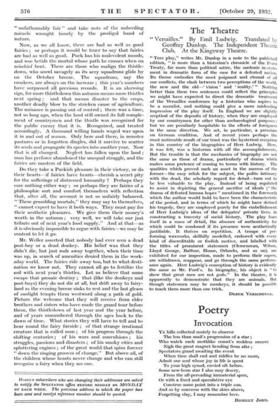The Theatre
" Tins play," writes Mr. Dunlop in a note to the published edition, " is more than a historian's chronicle of the Peace Treaty, far more than political satire, the sardonic re-state- ment in dramatic form of the case for a defeated nation. Its theme embodies the most poignant and eternal of all our conflicts, the clash between two perceptions of the world, the new and the old—' vision ' and reality.' " Nothing better than these two sentences could reflect the principles we might have expected to direct the dramatic treatment of the Wrsailles conference by a historian who aspires to be a moralist, and nothing could give a more misleading impression of • the play itself. In England we are slightly sceptical of the deposits of history, when they are employed by our countrymen for other than archaeological purposes : but we are peculiarly hospitable to the efforts of foreigners in the same direction. We set, in particular, a premium on German erudition. And of recent years perhaps the most noticeable result of our trust was the hysterical reception in this country of the biographies of Herr Ludwig. Here, it was felt, was a historian with all the accomplishments. But the trouble is that the mechanics of biography are not the same as those of drama, particularly of drama which makes some pretence of coming to terms with history. The qualities which proved such an asset in the success of the former—the easy relish for the subject, the polite intimacy with the dead, the scholarly regard for detail—turn out to be less valuable to the play. Instead of being regulated to assist in depicting the general sacrifice of ideals (" the drama of defeated human hopes " mentioned in the foreword) which the author would hold to have been the characteristic of the period, and in terms of which he might have defined his tragedy, they are employed purely for the embellishment of Herr Ludwig's ideas of the delegates' private lives, in constructing a travesty of social history. The play loses itself in a mass of detail, the absence of authenticity for which could be condoned if its presence were aesthetically justifiable. It thrives on repetition. A troupe of per- forming waxworks, skilfully modelled, endowed with every kind of discreditable or foolish motive, and labelled with the titles of prominent statesmen (Clemenceau, Wilson, Lloyd George, Balfour, House, Orlando, and so on), are exhibited for our inspection, made to perform their capers, are withdrawn, reappear, and go through the same perform- ance again. Herr Ludwig's conception of history is evidently the same as Mr. Ford's. In biography, his object is " to show that great men are not gods." In the theatre, it is apparently to demonstrate that they are animals. But though statesmen may be monkeys, it should be possible to teach them more than one trick.
DEREK YEESCHOYLE.












































 Previous page
Previous page